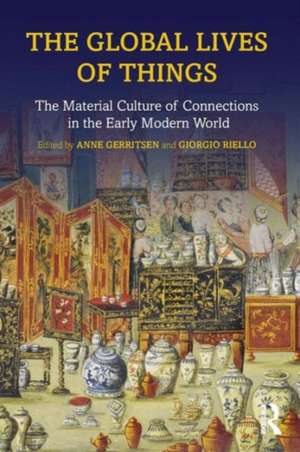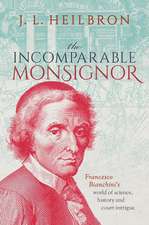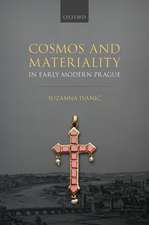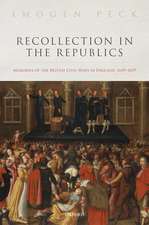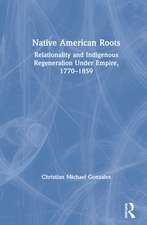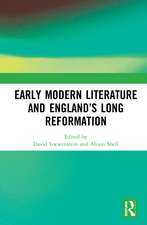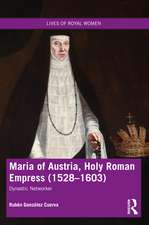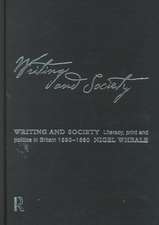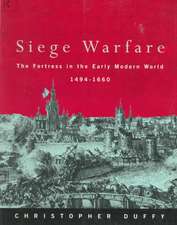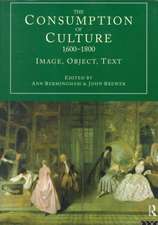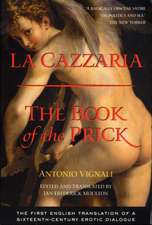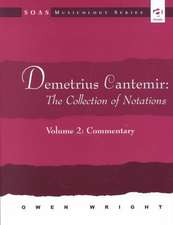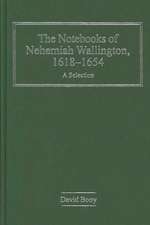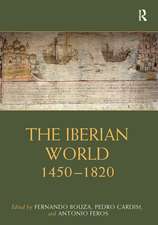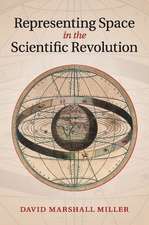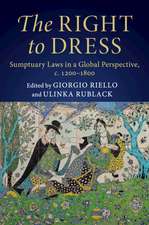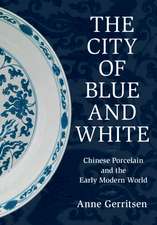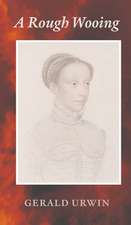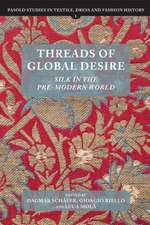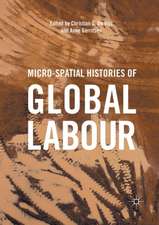The Global Lives of Things: The Material Culture of Connections in the Early Modern World
Autor Anne Gerritsen, Giorgio Rielloen Limba Engleză Paperback – dec 2015
This exciting new collection draws together the latest scholarship in the study of material culture and offers students a critique and explanation of the notion of commodity and a reinterpretation of the meaning of exchange. It engages with the concepts of ‘proto-globalization’, ‘the first global age’ and ‘commodities/consumption’. Divided into three parts, the volume considers in Part One, Objects of Global Knowledge, in Part Two, Objects of Global Connections, and finally, in Part Three, Objects of Global Consumption. The collection concludes with afterwords from three of the leading historians in the field, Maxine Berg, Suraiya Faroqhi and Paula Findlen, who offer their critical view of the methodologies and themes considered in the book and place its arguments within the wider field of scholarship.
Extensively illustrated, and with chapters examining case studies from Northern Europe to China and Australia, this book will be essential reading for students of global history.
| Toate formatele și edițiile | Preț | Express |
|---|---|---|
| Paperback (1) | 447.13 lei 6-8 săpt. | |
| Taylor & Francis – dec 2015 | 447.13 lei 6-8 săpt. | |
| Hardback (1) | 1061.81 lei 6-8 săpt. | |
| Taylor & Francis – 7 dec 2015 | 1061.81 lei 6-8 săpt. |
Preț: 447.13 lei
Nou
Puncte Express: 671
Preț estimativ în valută:
85.56€ • 89.33$ • 70.81£
85.56€ • 89.33$ • 70.81£
Carte tipărită la comandă
Livrare economică 04-18 aprilie
Preluare comenzi: 021 569.72.76
Specificații
ISBN-13: 9781138776753
ISBN-10: 1138776750
Pagini: 282
Ilustrații: 4 black & white illustrations, 1 black & white tables, 54 black & white halftones
Dimensiuni: 156 x 234 x 23 mm
Greutate: 0.4 kg
Ediția:1
Editura: Taylor & Francis
Colecția Routledge
Locul publicării:Oxford, United Kingdom
ISBN-10: 1138776750
Pagini: 282
Ilustrații: 4 black & white illustrations, 1 black & white tables, 54 black & white halftones
Dimensiuni: 156 x 234 x 23 mm
Greutate: 0.4 kg
Ediția:1
Editura: Taylor & Francis
Colecția Routledge
Locul publicării:Oxford, United Kingdom
Public țintă
Postgraduate and UndergraduateCuprins
Introduction The Global Lives of Things: Material Culture in the First Global Age Anne Gerritsen and Giorgio Riello PART I: OBJECTS OF GLOBAL KNOWLEDGE 1. Itineraries of Matter and Knowledge in the Early Modern World Pamela Smith 2. Towards a Global History of Shagreen Christine Guth 3. The Coral Network: The Trade of Red Coral to the Qing Imperial Court in the Eighteenth Century Pippa Lacey PART II: OBJECTS OF GLOBAL CONNECTIONS 4. Beyond the Kunstkammer: Brazilian Featherwork and the Northern European Court Festivals Mariana Françozo 5. The Empire in the Duke’s Palace. Global Material Culture in Sixteenth-century Portugal Nuno Senos 6. Dishes, Coins and Pipes: The Epistemological and Emotional Power of VOC Material Culture in Australia Susan Broomhall 7. Encounters around the Material Object: French and Indian Consumers in Eighteenth-Century Pondicherry Kévin Le Doudic PART III: OBJECTS OF GLOBAL CONSUMPTION 8. Customs and Consumption: Russia’s Global Tobacco Habits in the Seventeenth and Eighteenth Centuries Matthew P. Romaniello 9. Sugar Revisited: Sweetness and the Environment in the Early Modern World Urmi Engineer 10. Coffee, Mind and Body: Global Material Culture and the Eighteenth-Century Hamburg Import Trade Christine Fertig and Ulrich Pfister Afterword – Paula Findlen Afterword – Suraiya Faroqhi Afterword – Maxine Berg
Notă biografică
Anne Gerritsen is Associate Professor in the Department of History at the University of Warwick. Her previous publications include Ji'an Literati and the Local in Song-Yuan-Ming China (2007).
Giorgio Riello is Professor in the Department of History at the University of Warwick. In addition to several edited collections, he is the author of A Foot in the Past (2006) and Cotton: The Fabric that Made the Modern World (2013).
Giorgio Riello is Professor in the Department of History at the University of Warwick. In addition to several edited collections, he is the author of A Foot in the Past (2006) and Cotton: The Fabric that Made the Modern World (2013).
Recenzii
"Gerritsen and Riello's Global Lives of Things is a truly ground-breaking collections of essays. The volume bestrides the intersection of two of the most important recent developments in the study of history - the material turn and the global turn - and is the first to apply these in so concerted a way to the early modern period . The individual contributions, which range across Europe, China, India and Australia, and which consider commodities including sharkskin, coral and tobacco, are uniformly strong; together they highlight the connections between the local and the microcosmic and the international and the macrocosmic, to give a much better sense of the way early moderns lived their lives. This volume will be required reading not only for students of the early modern period, but also for those interested in the 'things' that have been used in the past, and the global connections which often lay behind them."
Kenneth Austin, University of Bristol, UK
"This pathbreaking volume explores how materials, artefacts and commodities traveled across the globe in the early modern period. Its object lessons shed light on how things in circulation could acquire new meanings and values, transform social relations, shape the environment, and set in motion novel constellations of knowledge. Combining approaches from material culture, economic history, consumption studies, and the history of science, The Global Lives of Things offers a perfect example of how global history needs to be studied in context."
Dániel Margócsy,, Hunter College, The City University of New York, USA
"Gerritsen and Riello's The Global Lives of Things is a truly ground-breaking collection of essays. The volume bestrides the intersection of two of the most important recent developments in the study of history - the material turn and the global turn - and is the first to apply these in so concerted a way to the early modern period . The individual contributions, which range across Europe, China, India and Australia, and which consider commodities including sharkskin, coral and tobacco, are uniformly strong; together they highlight the connections between the local and the microcosmic and the international and the macrocosmic, to give a much better sense of the way early moderns lived their lives. This volume will be required reading not only for students of the early modern period, but also for those interested in the 'things' that have been used in the past, and the global connections which often lay behind them."
- Kenneth Austin, University of Bristol, UK
"This pathbreaking volume explores how materials, artefacts and commodities traveled across the globe in the early modern period. Its object lessons shed light on how things in circulation could acquire new meanings and values, transform social relations, shape the environment, and set in motion novel constellations of knowledge. Combining approaches from material culture, economic history, consumption studies, and the history of science, The Global Lives of Things offers a perfect example of how global history needs to be studied in context."
- Dániel Margócsy, Hunter College, The City University of New York, USA
"Overall, this volume makes a valuable contribution to an emerging field (...) Summing Up: Recommended"
- J. Werner, Western Michigan University in CHOICE
"The editors and Routledge should be acknowledged for taking the various essays with their differing lengths and making them read smoothly as part of the same volume. (...) The chapters are well illustrated, and although there is not a map in every one, readers can locate the places mentioned in a particular text by looking at the maps contained in other chapters. Readers looking to deepen their knowledge of either the general trends or the particular details of the objects discussed, can avail themselves of the rich endnotes included with each chapter. As a result, both readers well-versed in the topics discussed, as well as those for whom they are completely new, will find, as Findlen notes in her afterword, that “small things can tell big stories” (page 244)."
- James G. Schryver, University of Minnesota
Kenneth Austin, University of Bristol, UK
"This pathbreaking volume explores how materials, artefacts and commodities traveled across the globe in the early modern period. Its object lessons shed light on how things in circulation could acquire new meanings and values, transform social relations, shape the environment, and set in motion novel constellations of knowledge. Combining approaches from material culture, economic history, consumption studies, and the history of science, The Global Lives of Things offers a perfect example of how global history needs to be studied in context."
Dániel Margócsy,, Hunter College, The City University of New York, USA
"Gerritsen and Riello's The Global Lives of Things is a truly ground-breaking collection of essays. The volume bestrides the intersection of two of the most important recent developments in the study of history - the material turn and the global turn - and is the first to apply these in so concerted a way to the early modern period . The individual contributions, which range across Europe, China, India and Australia, and which consider commodities including sharkskin, coral and tobacco, are uniformly strong; together they highlight the connections between the local and the microcosmic and the international and the macrocosmic, to give a much better sense of the way early moderns lived their lives. This volume will be required reading not only for students of the early modern period, but also for those interested in the 'things' that have been used in the past, and the global connections which often lay behind them."
- Kenneth Austin, University of Bristol, UK
"This pathbreaking volume explores how materials, artefacts and commodities traveled across the globe in the early modern period. Its object lessons shed light on how things in circulation could acquire new meanings and values, transform social relations, shape the environment, and set in motion novel constellations of knowledge. Combining approaches from material culture, economic history, consumption studies, and the history of science, The Global Lives of Things offers a perfect example of how global history needs to be studied in context."
- Dániel Margócsy, Hunter College, The City University of New York, USA
"Overall, this volume makes a valuable contribution to an emerging field (...) Summing Up: Recommended"
- J. Werner, Western Michigan University in CHOICE
"The editors and Routledge should be acknowledged for taking the various essays with their differing lengths and making them read smoothly as part of the same volume. (...) The chapters are well illustrated, and although there is not a map in every one, readers can locate the places mentioned in a particular text by looking at the maps contained in other chapters. Readers looking to deepen their knowledge of either the general trends or the particular details of the objects discussed, can avail themselves of the rich endnotes included with each chapter. As a result, both readers well-versed in the topics discussed, as well as those for whom they are completely new, will find, as Findlen notes in her afterword, that “small things can tell big stories” (page 244)."
- James G. Schryver, University of Minnesota
Descriere
The Global Lives of Things considers the ways in which ‘things’, ranging from commodities, to works of art and precious materials, participated in the shaping of ‘globalisation’ in the early modern period. By focusing on the European encounters with the Americas and Australia, this volume traces the movements of objects through human networks of commerce, colonialism and curiosity. Divided into four parts, the volume considers, Objects of Global Encounters, Matter and Global Knowledge, New Consuming Habits and lastly Constructing Global Spaces. This book will be essential reading for students of material culture and the early modern world.
